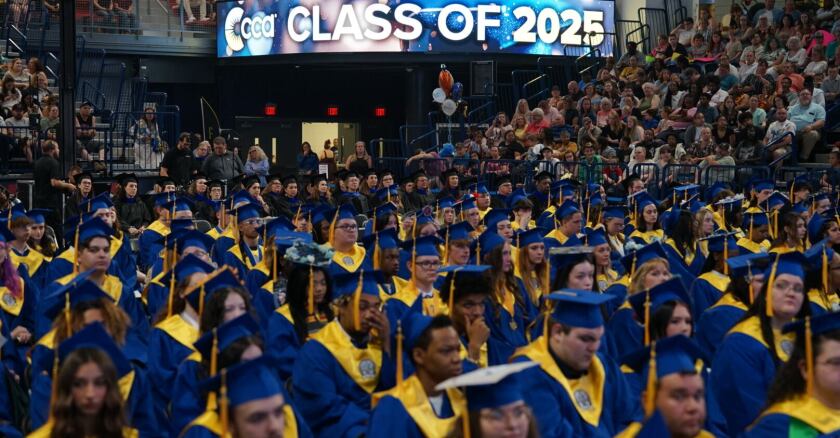Science
Pennsylvania Cyber Charter Funding Debate Heats Up Amid Budget Talks

Negotiations in Harrisburg, Pennsylvania, are increasingly critical as lawmakers seek to address the funding model for cyber charter schools. The outcome of these discussions will likely influence future property tax bills and the quality of local education. One prominent proposal aims to reform how cyber charter schools are financed, with implications for approximately 70,000 students enrolled in these institutions.
Currently, Pennsylvania’s cyber charter schools receive funding from local and state tax revenues that flow through local school district budgets. A bill passed by the Democratic-led House in June proposes capping tuition at $8,000 per student, which could conserve about $250 million from local districts. Despite the potential savings, the measure gained support from only two Republican lawmakers, leaving its fate uncertain in the Republican-led Senate.
Critics of the current funding model, including some Democrats, argue that cyber charter schools are financially mismanaging their resources. During recent hearings, Rob Gleason, president of the Westmont Hilltop School Board, asserted that cyber schools should receive less funding, citing their lower expenses for services such as school lunches and nursing staff. “Their excess of revenue over expenses is criminal,” Gleason claimed, highlighting concerns over financial accountability.
Conversely, many Republicans view the proposed funding cuts as a threat to school choice. Rep. Roman Kozak, the only Pennsylvania legislator with experience working in a cyber school, emphasized the unique financial demands faced by these institutions. “It’s not just jump on Zoom and have a class,” Kozak stated, pointing to essential cybersecurity and student record security measures that incur substantial costs.
A detailed analysis by PennLive of the Pennsylvania Department of Education’s financial data reveals deep-rooted misconceptions surrounding cyber charter funding. The study, based on the latest figures from the 2023-2024 school year, indicates that the arguments for and against funding reform often stem from misunderstandings.
Finance experts are cautioning that current education funding appears inconsistent due to varying rates of expenditure of federal COVID-relief funds. Timothy Shrom, director of research at the Pennsylvania Association of School Business Officials, noted that different districts have used these funds at disparate rates, skewing per-student spending figures statewide.
A common claim among cyber charter advocates is that these schools receive only 70-75 percent of the funding allocated to traditional public schools. While Kozak reiterated this point during legislative hearings, experts assert that such figures are incomplete. They typically do not account for additional funding allocated for special education students, which could adjust the disparity to approximately 93 percent when all student types are considered.
The Pennsylvania School Board Association has pointed out that local districts are required to calculate payments to charter schools based on their expenditures divided by student populations, resulting in around 500 different tuition rates across the state. This system allows districts to deduct specific expenses, such as costs related to building maintenance and transportation, from what they owe to charter schools.
Those in favor of funding cyber schools argue that these deductions are unfair and do not reflect the reality of their operational costs. Michael Whisman, president of Vertex Education, which manages billing for many cyber charters, highlighted that cyber schools incur significant expenses related to Internet reimbursements for families, with the largest reimbursements reaching $675 per student annually.
Opponents maintain that the current funding structure disproportionately benefits cyber charters, particularly in regard to special education funding. Critics, including Lawrence Feinberg, the former director of the Keystone Center for Charter Change, argue that taxpayers should not subsidize cyber schools at the same rates paid for brick-and-mortar institutions, especially since cyber schools receive approximately double the funding for each special education student compared to their regular education counterparts.
The funding formula, which assumes that 16 percent of students require special education services, has not been updated to reflect shifting demographics. This misalignment has resulted in cyber schools receiving more funding for special education than many local districts spend. Recent legislative adjustments have already reduced total revenues to cyber schools by about $64 million, or 5 percent.
Local school leaders are now advocating for changes to another aspect of the funding formula. Currently, cyber charters receive a flat rate for each special education student, regardless of the severity of their disabilities. This approach has led some cyber schools to attract students with less severe disabilities, thereby keeping the funding surplus. In contrast, students with more severe disabilities often require in-person education, which cyber schools may not adequately provide.
As Pennsylvania lawmakers continue their budget discussions, the proposed reforms aim to tie funding more closely to the severity of disabilities rather than a flat rate. Advocates for change have urged lawmakers to consider these adjustments, emphasizing that the current structure leads to significant overpayments for special education services.
With the budget negotiations ongoing, the future of Pennsylvania’s cyber charter funding remains uncertain, and the implications will resonate far beyond state lines as the debate over education funding continues to evolve.
-

 Entertainment4 weeks ago
Entertainment4 weeks agoLove Island Star Toni Laite’s Mother Expresses Disappointment Over Coupling Decision
-

 Entertainment3 weeks ago
Entertainment3 weeks agoWoman Transforms Life with Boot Camp, Losing Nearly 9 Pounds in a Week
-

 Science4 weeks ago
Science4 weeks agoAstronomers Discover Giant Exoplanet in Star’s Dusty Surroundings
-

 Lifestyle4 weeks ago
Lifestyle4 weeks agoBring Birds to Events and Dine with Style: Trends This Week
-

 World4 weeks ago
World4 weeks agoCoronation Street Recasts Lily Platt Amid Dramatic Storyline
-

 Entertainment2 weeks ago
Entertainment2 weeks agoEpidemic Records Launches New Track “Get Up Stand Up” by 2Moreish
-

 Entertainment3 weeks ago
Entertainment3 weeks agoMary Goskirk’s Injury Raises Questions in Emmerdale Episode
-

 Sports4 weeks ago
Sports4 weeks agoGAA Faces Controversial Decision on DJ Carey Before Final
-

 Entertainment4 weeks ago
Entertainment4 weeks agoBob Vylan Drops Out of European Tour with Gogol Bordello After Controversy
-

 Lifestyle4 weeks ago
Lifestyle4 weeks agoAylesbury Committee Approves Controversial 24-Hour McDonald’s
-

 Entertainment4 weeks ago
Entertainment4 weeks agoJessica Alba’s New Relationship Unveiled with Younger Actor
-

 Entertainment4 weeks ago
Entertainment4 weeks agoKeeley Hawes Takes Risks in High-Octane New Series The Assassin









